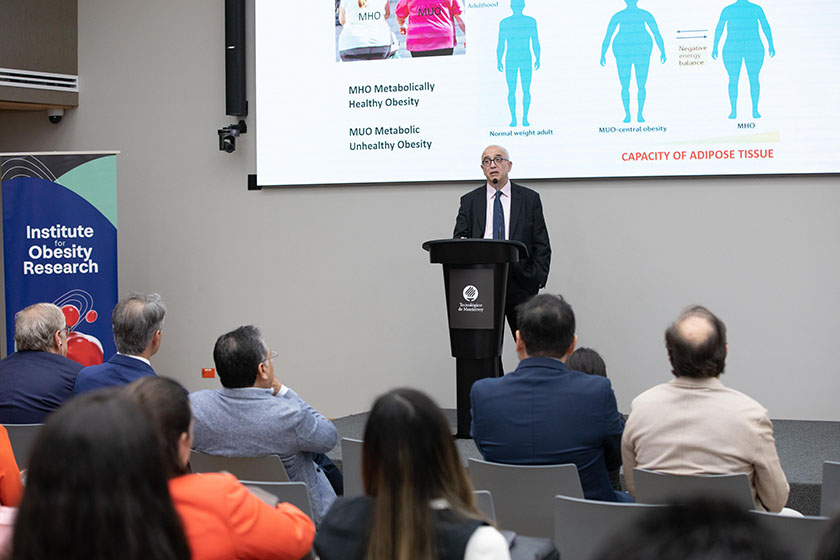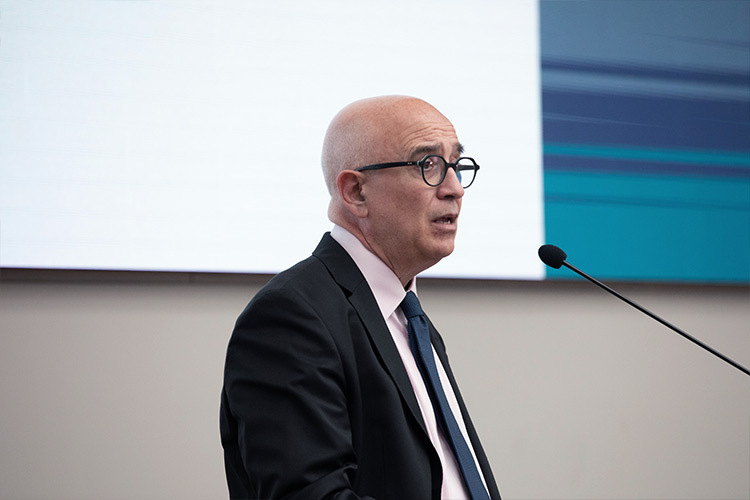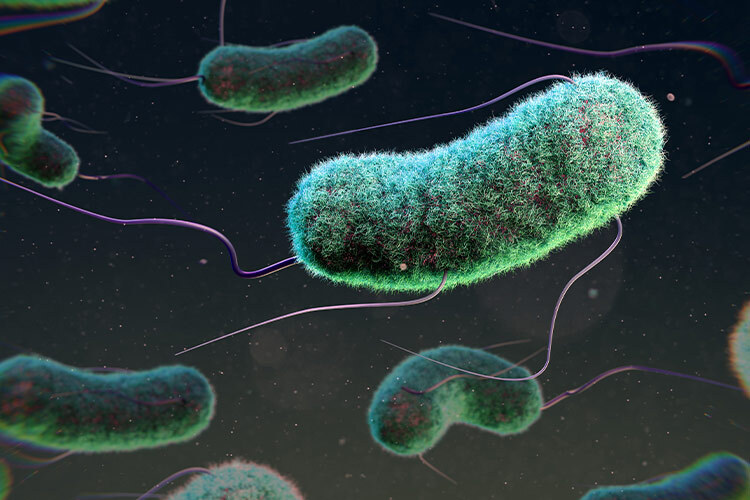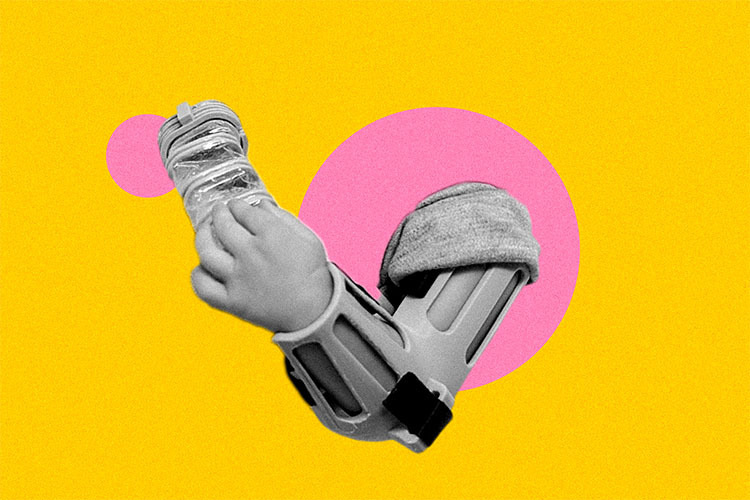There’s a common misconception in modern society: if people are obese, they have serious health issues. But this is not always the case, explains Antonio Vidal-Puig, a doctor and researcher who specializes in the study of metabolism and its relationship with obesity.
During the second International Conference on Obesity Research, the researcher explained the hypothesis that he and his team have been working on for years, called adipose tissue expansion.
The theory seeks to understand the molecular mechanisms that explain why some people with obesity have metabolic complications and other health problems, while others −who also have obesity− don’t.
After his lecture, entitled Molecular Insights of Healthy Obesity, the expert explained in an interview with TecScience how his research complements the understanding we have of obesity and how it can help with the treatment of this condition in future.
In addition, he shared his reflections on the social aspect of the issue and made a call to stop stigmatizing people with obesity.
A bigger suitcase
How would you explain the hypothesis you are working on in simple terms?
Our hypothesis says that each individual has a determined capacity of fat that their body can carry. For example, if you have a suitcase that can only carry 40 pounds and you try to put more in, your body won’t be able to hold it and it will send it towards the heart, or the liver, or other organs, where it will begin to cause problems. Each person has their own suitcase size.
What we are trying to say is that the amount of fat you store depends on what you eat and what you expend in a day, so you may have a remnant that you have to store, but if what you have to store is greater than the place where you can store it, then you have to put it in other places, and it’s in those places where fat causes damage.
In general, the population has the idea that the relationship between gaining weight and having health complications is linear, but you suggest that this is not the case. Could you elaborate on this concept?
We think that if you have a certain storage capacity while you are putting on weight, but you are still below your storage capacity, you can do it normally. But when you get closer to the limit, insulin resistance can happen if you put in a little extra food, since you no longer have the space to store it.
If someone has a lot of capacity from the start, they can ingest extra food for longer and the curve is more to the right, but if someone has a small storage space, they very quickly end up having no space, and problems may arise with a small weight increase.
Thin people can also have metabolic problems
Do all obese people have health problems and are all thin people healthy?
In practice you find things that are not so common. So, sometimes there are individuals who are thin and have metabolic problems, but those individuals may not be detected because they are thin, so you never think they might have a problem. It wouldn’t hurt to have a check-up somewhere every now and then, and if they see that there’s an increase in your triglycerides, for example, that should lead to further studies to see where this increase is coming from.
What you don’t want is to be doing complete and in-depth studies on everyone, because there’s no sense in that. However, there are some measurements, such as triglyceride levels, that can tell you to further analyze the case to find if there are bigger problems when an individual is thin but has high triglyceride levels.
And the same goes for people who are obese but maintain normal blood glucose and triglyceride levels, exercise regularly, and have muscle mass. Muscle mass helps.
I think this is the most important message; it’s not good to be obese, but if a person is obese, it’s very important for that person to be fit and to exercise in a safe and controlled way. It’s very important for obese patients to be fit within their capacities. So, I always tell them “It’s not about being fat, it’s about being fit,” so it is very important that this risk is reduced as well.
How does the environment influence obesity?
Nowadays, if you go to a supermarket, you find an area where there are 200,000 chocolates on display when you’re about to pay, so we’re not helping either.
There has to be an environment that -at least- doesn’t constantly encourage people to eat processed, high-fat, and high sugar products to excess. And then you have the media judging them for being obese.
So, when you have an obesogenic environment and a genetically predisposed individual, it’s like not feeding the lion and not wanting it to hunt.

The expert said that overweight people often “fight” against their own genes. (Photo: Alejandro Salazar / TecScience)
The future of obesity treatment
How do you think what you’ve learned through your research changes or complements what we know about obesity?
What we’re studying allows us to understand the connection between being obese and having health complications, and all this knowledge allows you to do two things: one, to be able to predict who is going to have complications and two, to identify how you can treat those complications.
That is one thing and another one is the social context. If you think that obese patients are obese because they deserve it or because they’re lazy, then that stigmatizes patients and the truth is that there is a very important genetic component. Not everyone who wants to be obese can be obese; your genes have to allow you to be obese. People with obesity don’t need to be stigmatized; they need us to understand that they’ve spent their entire history trying to fight their genes.
And it doesn’t mean they can’t do it, but it’s more difficult than if you’re constitutionally thin and have never had weight problems. So, I believe that more than stigmatizing, you have to respect them and the worst thing that can be done is to stigmatize and disrespect them, because then they become demotivated and stop fighting. We have to try to be understanding of their condition and help them.
For me, they are like heroes who are fighting against their genes. Sometimes, without knowing it, we are asking a lot of these people, to be able to control them, and other people don’t appreciate that.
If patients with obesity go to a clinic, do they have to lose all the extra weight they have?
When you’re treating patients with obesity and they lose 15 or 16 pounds, you’ll realize that they have improved if you look at their sugar and triglyceride levels. This improvement is not because they already have an optimal weight, it is because they have lost an affordable number of pounds that have a relevant biological importance.
So, I wouldn’t ask a patient to lose 80 pounds. You get these benefits by losing much less, and it’s important for people to know that they can get these advantages by losing these affordable extra pounds.
How can you predict which people would have complications if they were obese?
We’re looking for biomarkers related to lipids. Others are studying those related to triglycerides, or insulin. I think that what will happen is that there won’t be a single biomarker, but a combination of several biomarkers that will determine an individual’s risk of having complications.
With biomarkers, you want them to do three things: one, tell you who is going to have a disease, two, how that disease is going to progress, and three, if you give them a treatment, you have to be able to know if it’s working.
So, this is the challenge in treating someone with obesity. You have to know those three things. The type of knowledge that we propose allows you to have a series of parameters that you can interpret in this manner.
I believe that right now, when you have patients with obesity who have metabolic problems, we know that we have to insist and reinforce the idea of losing weight and getting treatment. On the other hand, you have to reinforce their self-esteem so that they are able to fight their own genes.
Will there be a drug or medication derived from your research that could help?
There are already new drugs that are going to be important in obesity. The complications that may arise are not resolved yet, nor are the complications that people already have, because if you treat a patient with obesity, someone who already has complications, treatment does not always mean that the complications will disappear completely.
So, that’s why it’s important to focus obesity treatment on the possibility of improving complications. If you have heart problems and you are in treatment, your weight may decrease, but it does not mean that your heart is healthy again, for example, so prevention is very important, not waiting for a complication to arise to realize that you have a problem and need to solve it.
The concept of prevention is very important and the other thing is to support individuals. If you look at all the media, or at what some doctors say, you hear that a patient with obesity is an individual who doesn’t have any willpower, but that is a simplistic approach.
This doesn’t help because it’s totally unfair. You are asking a human being to have absolute control over his or her environment and genes.
What message would you like to give people on the subject of obesity and what have you learned about it?
Well, tell them that there is hope, because there are some new drugs that are very powerful and that are going to help curb obesity, in addition to the fact that the knowledge we have is already advancing.
If you have obesity, don’t be afraid to go to a doctor. Get checked and get treatment if you need it. Have confidence in science and the fact that science is working for you.
















